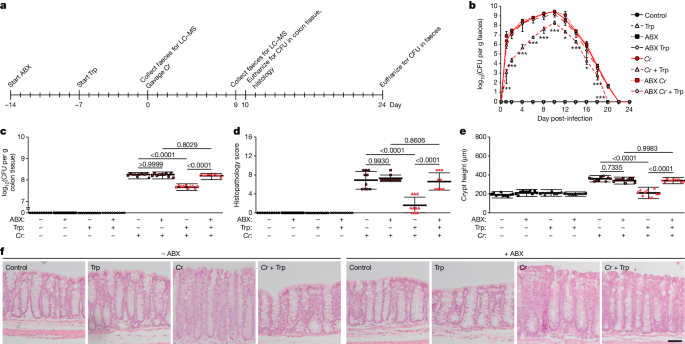Dopamine Receptor D2 and Colonization Resistance Against Enteric Pathogens
核心概念
Activation of the dopamine receptor D2 in the gut epithelium by microbial metabolites from dietary supplementation with l-tryptophan provides protection against enteric pathogens, revealing a novel pathway for colonization resistance.
要約
The gut microbiome plays a crucial role in protecting the host against enteric pathogens like EHEC. Activation of the dopamine receptor D2 by microbial metabolites from l-tryptophan supplementation enhances colonization resistance by controlling actin cytoskeletal organization in the gut epithelium, offering potential therapeutic interventions for gastrointestinal infections.
Dopamine receptor D2 confers colonization resistance via microbial metabolites - Nature
統計
Gut microbiome modulates host physiology.
Activation of DRD2 protects against Citrobacter rodentium.
Tryptophan-derived metabolites decrease expression of host actin regulatory protein.
DRD2 controls actin cytoskeletal organization in gut epithelium.
引用
"Our findings may inspire prophylactic and therapeutic approaches targeting DRD2 with dietary or pharmacological interventions to improve gut health and treat gastrointestinal infections."
抽出されたキーインサイト
by Samantha A. ... 場所 www.nature.com 03-13-2024
https://www.nature.com/articles/s41586-024-07179-5
深掘り質問
How can the activation of DRD2 outside the nervous system impact other physiological processes?
The activation of dopamine receptor D2 (DRD2) outside the nervous system, as seen in the context provided, showcases a novel role for this receptor in controlling actin cytoskeletal organization in the gut epithelium. This finding suggests that DRD2 activation by microbial metabolites derived from dietary supplementation with l-tryptophan can influence host defense mechanisms against enteric pathogens like Citrobacter rodentium. Beyond its traditional role in neurotransmission, DRD2 activation outside the nervous system could potentially impact various physiological processes related to gut health and immune responses. For instance, it may modulate intestinal barrier function, mucosal immunity, and inflammatory signaling pathways within the gastrointestinal tract. Additionally, since gut-brain communication is bidirectional through the gut-brain axis, alterations in DRD2 activity in the gut could have implications for neurological functions and mental health via microbiota-gut-brain interactions.
What are the potential drawbacks or limitations of targeting DRD2 for treating gastrointestinal infections?
While targeting dopamine receptor D2 (DRD2) presents a promising avenue for treating gastrointestinal infections by enhancing colonization resistance against pathogens like Citrobacter rodentium or enterohaemorrhagic Escherichia coli (EHEC), there are several potential drawbacks and limitations to consider. Firstly, manipulating DRD2 activity pharmacologically or through dietary interventions may have off-target effects on other physiological systems due to its widespread distribution throughout the body. This could lead to unintended consequences or adverse reactions unrelated to infection control. Moreover, chronic modulation of DRD2 signaling might disrupt normal neurotransmission pathways involved in mood regulation and movement control since it is a key player in dopaminergic signaling within the central nervous system.
Furthermore, long-term use of drugs targeting DRD2 raises concerns about tolerance development or drug resistance over time which could diminish their efficacy in combating gastrointestinal infections effectively. Additionally, individual variations in response to such treatments based on genetic factors or existing medical conditions need consideration when implementing targeted therapies involving DRD2 modulation.
How might understanding noncanonical pathways for colonization resistance influence future research on gut health?
The discovery of noncanonical pathways for colonization resistance against attaching and effacing (AE) pathogens like Citrobacter rodentium provides valuable insights into how host-microbiome interactions shape gut health outcomes beyond conventional mechanisms. Understanding these alternative routes through which microbial metabolites can activate receptors such as dopamine receptor D2 (DRD2) sheds light on previously unexplored aspects of host defense strategies against gastrointestinal infections.
This newfound knowledge opens up avenues for innovative research directions focusing on leveraging unconventional pathways to enhance colonization resistance and combat pathogenic invasions more effectively. By exploring noncanonical mechanisms involving neurotransmitter receptors like DRD ̧ researchers can develop novel therapeutic approaches that target specific molecular targets implicated in maintaining a healthy gut ecosystem while minimizing disruption to beneficial commensal microbes essential for overall well-being.
0
